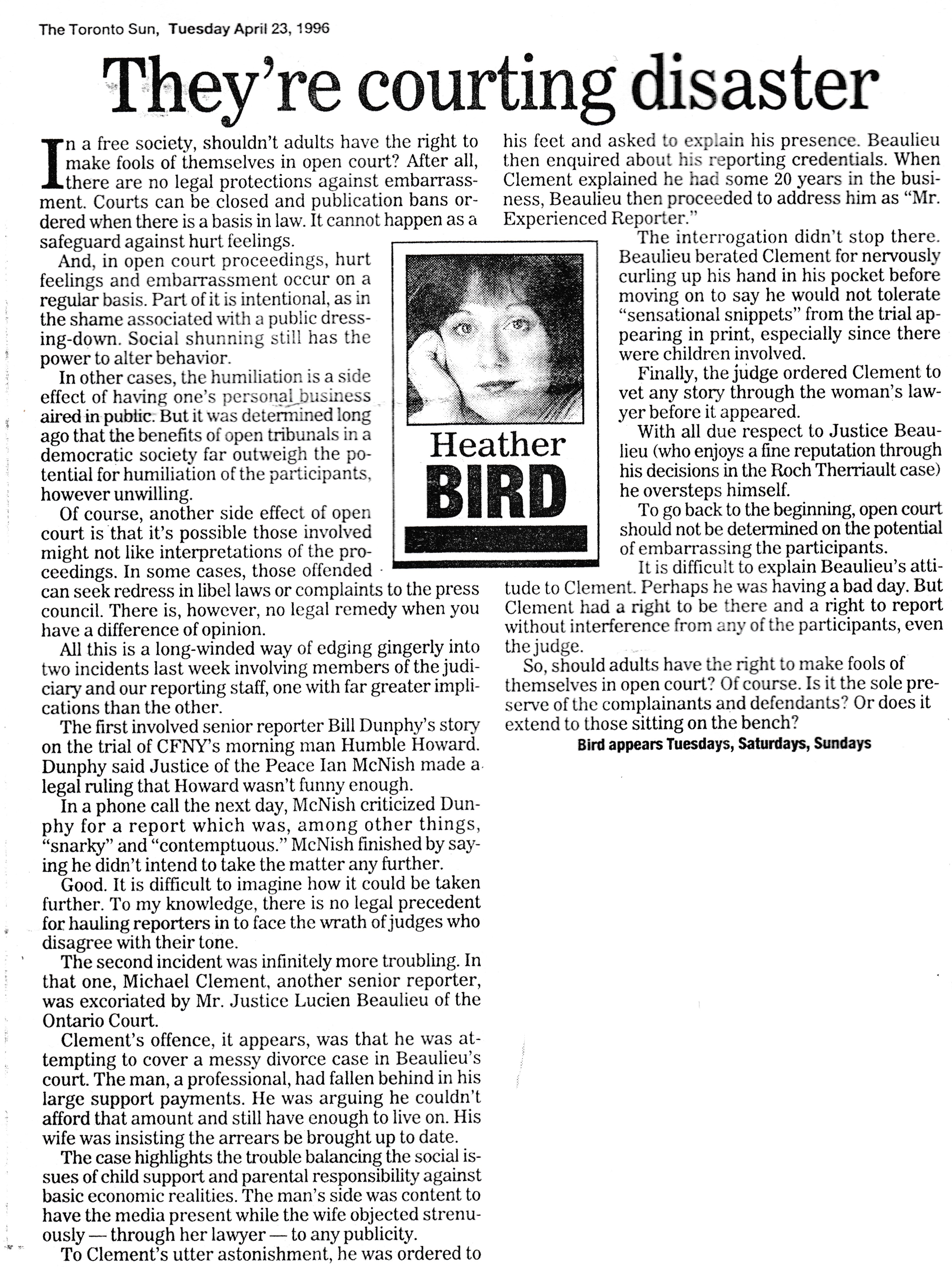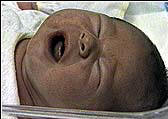
They're Courting Disaster
The Toronto Sun, by Heather Bird, April 23, 1996
Editor's comments
The highest court below the Ontario Court of Appeal, in the late 80's was the Supreme Court of Ontario which then, in the early 90's, was renamed, Ontario Court of Justice (General Division), and then was rename Ontario Superior Court of Justice, in 1999. In some other provinces the court is named Court of Queen's Bench. The article below is about Mr Justice Lucien Beaulieu of the Ontario Court of Justice (General Division).
In a free society, shouldn't adults have the right to make fools of themselves in open court? After all there are no legal protections against embarrassment. Court can be closed and publication bans ordered when there is a basis in law. It cannot happen as a safeguard against hurt feelings.
And, in open court proceedings, hurt feelings and embarrassment occur on a regular basis. Part of it is intentional, as in the shame associated with a public dressing-down. Social shunning still has the power to alter behaviour.
In other cases, the humiliation is a side effect of having one's personal business aired in public. But it was determined long ago that the benefits of open tribunals in a democratic society far outweigh the potential for humiliation of the participants, however unwilling.
Of course, another side effect of open courts is that it's possible those involved might not like interpretations of proceedings. In some cases, those offended can seek redress in libel laws or complaints to the press council. There is, however, no legal remedy when you have a difference of opinion.
All this is a long-wonded way of edging gingerly into two incidents last week involving members of the judiciary and our reporting staff, one with far greater implications than the other.
The first involved senior reporter Bill Dunphy's story on the trial of CFNY's morning man Humble Howard. Dunphy said Justice of the Peace Ian McNish made a legal ruling that Howard wasn't funny enough.
In a phone call the next day, McNish criticized Dunphy for a report which was, among other things, "snarky" and "contemptuous." McNish finished by saying he didn't intend on taking the matter any further.
Good. It is difficult to imagine how it could be taken further. To my knowledge, there is no legal precedent for hauling reporters in to face the Wrath of judges who disagree with their tone.
The second incident was infinitely more troubling. In that one, Michael Clement, another senior reporter, was excoriated by Mr. Justice Lucien Beaulieu of the Ontario Court.
Clement's offence, it appears, was that he was attempting to cover a messy divorce case in Beaulieu's court. The man, a professional, had fallen behind in his large support payments. He was arguing he couldn't afford that amount and still have enough to live on. His wife was insisting the arrears be brought up to date.
The case highlights the trouble balancing the social issues of child support and parental responsibility against basic economic realities. The man's side was content to have the media present while the wife objected strenuously - through her lawyer - to any publicity.
To Celement's utter astonishment, he was ordered to his feet and asked to explain his presence. Beaulieu then enquired about his reporting credentials. When Celement explained he had some 20 years in the business, Beaulieu then proceeded to address him as "Mr. Experienced Reporter."
The interrogation didn't stop there. Beaulieu berated Clement for nervously curling up his hand in his pocket before moving on to say he would not tolerate "sensational snippets" from the trial appearing in print, especially since there were children involved.
With all due respect to Justice Beaulieu ( who enjoys a fine reputation through his decisions in the Roch Therriault case) he oversteps himself.
To go back to the beginning, open court should not be determined on the potential of embassassing the particpants.
It is difficult to explain Beaulieu's attitude to Clement. Perhaps he was having a bad day. But Clement had a right to be there and a right to report without interference from any of the participants, even the judge.
So, should adults have the right to make fools of themselves in open court? Of course. It is the sole preserve of the complainants and defendants? Or does it extend to those sitting on the bench?



